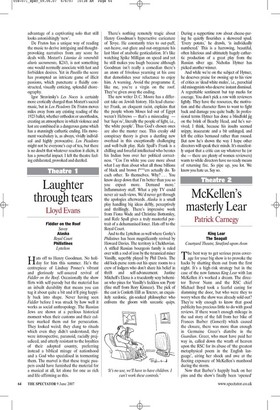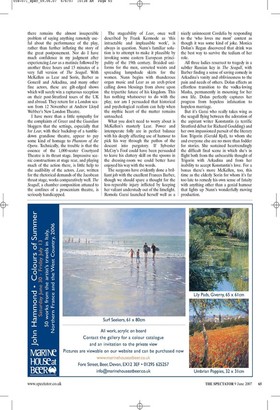McKellen's masterly Lear
Patrick Camegy King Lear The Seagull Courtyard Theatre, Stratford-upon-Avon The best way to get serious press cover1 age for your big show is to provoke the hacks by shutting them out from the first night. It's a high-risk strategy but in the case of the now famous King Lear with Ian McKellen it's worked a dream. The director Trevor Nunn and the RSC chief Michael Boyd took a fearful caning for slamming the door, but who were they to worry when the show was already sold out? They're wily enough to know that good publicity has precious little to do with good reviews. If there wasn't enough mileage in the sad story of the fall from her bike of Frances Barber (Goneril) which caused the closure, there was more than enough in Germaine Greer's diatribe in the Guardian. Greer, who must have paid her way in, called down the wrath of heaven upon the RSC for its abuse of `the greatest metaphysical poem in the English language', airing her shock and awe at the fleeting exposure of McKellen's manhood during the storm.
Now that Barber's happily back on her pins and the show's finally been 'opened' there remains the almost insuperable problem of saying anything remotely useful about the performance of the play, rather than further inflating the story of the great postponement. Nor do I have much confidence in my judgment after experiencing Lear as a matinee followed by another three hours and 15 minutes of a very full version of The Seagull. With McKellen as Lear and Sorin, Barber as Goneril and Arkadina, and many other fine actors, these are gilt-edged shows which will surely win a rapturous reception on their post-Stratford tours of the UK and abroad. They return for a London season from 12 November at Andrew Lloyd Webber's New London Theatre.
I have more than a little sympathy for the complaints of Greer and the Guardian bloggers that the settings, especially that for Lear, with their backdrop of a tumbledown grandiose theatre, appear to pay some kind of homage to Phantom of the Opera. Technically, the trouble is that the essence of the 1,000-seater Courtyard Theatre is its thrust stage. Impressive scenic constructions at stage rear, and playing much of the action there, is little help to the audibility of the actors. Lear, written for the rhetorical demands of the Jacobean thrust stage, works comparatively well. The Seagull, a chamber composition attuned to the confines of a proscenium theatre, is seriously handicapped.
The stageability of Lear, once well described by Frank Kermode as 'this intractable and implausible work', is always in question. Nunn's familiar solution is to attempt to make it plausible by invoking some eastern European principality of the 19th century. Braided uniforms for the men, corseted waists and spreading lampshade skirts for the women. Nunn begins with thunderous organ music and Lear as an arch-priest calling down blessings from above upon the tripartite future of his kingdom. This has nothing whatsoever to do with the play, nor am I persuaded that historical and psychological realism can help when the mythic heart of the matter remains untouched.
What you don't need to worry about is McKellen's masterly Lear. Power and intemperate folly are in perfect balance with his deeply affecting use of humour to pick his way through the pathos of the descent into purgatory. If Sylvester McCoy's Fool could have been persuaded to leave his clattery skill on the spoons in the dressing-room we could better have enjoyed his way with the words.
The surgeons have evidently done a brilliant job with the excellent Frances Barber, though we should spare a thought for the less-reparable injury inflicted by keeping her valiant understudy out of the limelight. Romola Garai launched herself well as a nicely uninnocent Cordelia by responding to the 'who loves me most' contest as though it was some kind of joke. Monica Dolan's Regan discovered that drink was the best way to survive the tedium of her role.
All three ladies resurrect to tragedy in a subtler Russian key in The Seagull, with Barber finding a sense of saving comedy in Arkadina's vanity and obliviousness to the pain and needs of others. Dolan effects an effortless transition to the vodka-loving Masha, permanently in mourning for her own life. Dolan perfectly captures her progress from hopeless infatuation to hopeless marriage.
But it's Garai who really takes wing as the seagull flying between the adoration of the aspirant writer Konstantin (a terrific Stratford debut for Richard Goulding) and her own impassioned pursuit of the literary lion Trigorin (Gerald Kyd), to whom she and everyone else are no more than fodder for stories. She sustained heartrendingly the difficult final scene in which she's in flight both from the unbearable thought of Trigorin with Arkadina and from her inability to accept Konstantin's love. For a bonus there's more McKellen, too, this time as the elderly Sorin for whom it's far too late to remedy his own sense of fatuity with anything other than a genial humour that lights up Nunn's wonderfully moving production.





























































 Previous page
Previous page